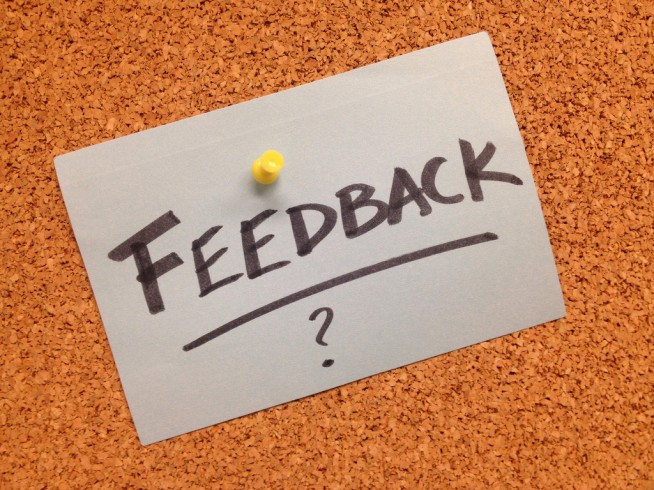Once you begin to take action on a project or a goal, you’ll start getting feedback about whether you’re doing the right thing. You’ll get data, advice, help, suggestions, direction – and even criticism – that will help you constantly adjust and move forward, while continually enhancing your knowledge, abilities, attitudes and relationships.
But asking for feedback is really only the first part of the equation. Once you receive feedback you have to be willing to embrace it and respond to it.
Positive or Negative … it’s ALL good!
There are two kinds of feedback you might encounter, negative and positive. We tend to prefer the positive: results, money, praise, promotion, raise, awards, happiness, inner peace, etc. It feels better. It tells us we are on course and doing the right thing.
We tend not to like negative feedback: lack of results, little or no money, criticism, poor evaluations, complaints, unhappiness, inner conflict, pain, etc.
However, there is as much useful data in negative feedback as there is in positive feedback. It tells us that we are off course, headed in the wrong direction, and doing the wrong thing. This is priceless information!
How Most People Handle the Negative
Three of the most common – and unproductive – responses to negative criticism are:
• Caving in and quitting. How many times have you or someone you know hit an obstacle and given up the goal because it was too hard or “not meant to be?” This is a poor way to respond to criticism, because all it does it keep you stuck in the same place.
• Getting mad at the source of the feedback. How many times have you responded with anger, hostility or resentment when someone has given you negative feedback? This serves only to push away the messenger and the feedback, when the message you’re receiving may be exactly what you need to hear to move closer to your goal.
• Ignoring the feedback. We all know people who tune out everyone’s point of view but their own. The sad thing is that the feedback they are blocking could significantly change their lives, if only they would listen.
If you fall into any of these traps, try to remember that feedback is not criticism. It is simply information – corrective guidance that’s meant to help to get you back on course to achieve your goal. I like to refer to negative feedback as information for “improvement opportunities.”
Not every action will produce the desired result. Not every action will work. Making mistakes, getting it almost right, and experimenting to see what happens are all part of the process of eventually getting it right.
Thomas Edison is reported to have tried over 2,000 different experiments that failed before he finally got the light bulb to work. He once told a reporter that, from his perspective, he had never failed at all. Inventing the light bulb was just a 2,000-step process. If you can adopt that attitude, then you can be free to take an action, notice what result you get, and then adjust your next actions based on the feedback you have received.
The Most Valuable Question You May Ever Learn
In the 1980s, a multimillionaire businessman taught me a question that radically changed the quality of my life. So what is this magical question that can improve the quality of every relationship you are in, every product you produce, every service you deliver, every meeting you conduct, every class you teach and every transaction you enter?
Here it is:
“On a scale of 1 to 10, how would you rate the quality of our relationship during the last week?”
Here are a number of variations on this question that have served me well over the years…
“On a scale of 1 to 10, how would you rate:”
| -our service? | -our product? | ||
| -my teaching? | -this class/seminar/workshop? | ||
| -this meeting? | -our date/vacation? | ||
| -this meal? | -my coaching/management? | ||
| -our performance? | -my parenting/babysitting? | ||
| -this book? | -this recording/show? |
Any answer less than a 10 always gets this follow-up question:
This is where the really valuable information comes from. Knowing that a person is dissatisfied is not enough. Knowing in detail what will satisfy them gives you the information you need to do whatever it takes to create a winning product, service or relationship.
Ask Yourself for Feedback
In addition to asking others for feedback, ask yourself for feedback, too. Your body is very adept at telling you whether you are on course. When you are relaxed and happy, your body is telling you that you are on track. When you are constantly exhausted, tense, in pain, unhappy and angry, then you are off track.
Take time to listen to what your body is saying to you. Take time to listen to your physical sensations and your feelings. They are sending you important messages.
Remember, feedback is simply information. You don’t have to take it personally; just welcome it and use it. @JackCanfield (Click to Tweet!)
As the beloved originator of the Chicken Soup for the Soul® series, Jack Canfield fostered the emergence of inspirational anthologies as a genre—and watched it grow to a billion dollar market. As the driving force behind the development and delivery of over 100 million books sold through the Chicken Soup for the Soul® franchise, Jack Canfield is uniquely qualified to talk about success. Jack is America’s #1 Success Coach and wrote the life-changing book The Success Principles: How to Get From Where You Are to Where You Want to Be and speaks around the world on this subject. Follow Jack at www.jackcanfield.com and sign up for his free resources today!
Chicken Soup for the Soul 20th Anniversary Edition NOW AVAILABLE:
Image courtesy of Giulia Forsythe.












